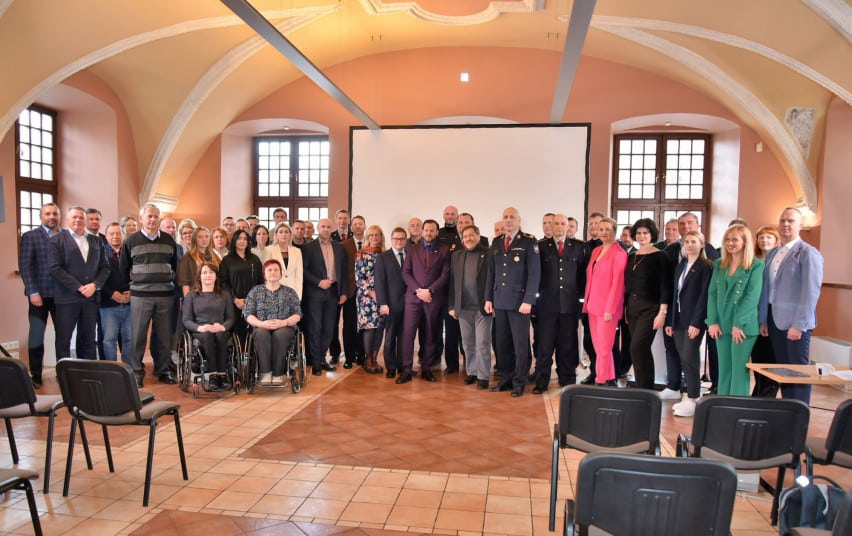Strong infrastructure and tried systems
Lithuania's nuclear preparedness project strategically focuses on practical readiness. The project enhances VATESI's (the Lithuanian State Nuclear Power Safety Inspectorate) capabilities, establishes a unified emergency management system, and specifically installs a technical warning system in the impact zone of the Belarusian Nuclear Power Plant. The project will deploy 197 sirens, capable of alerting a minimum of 75% of residents within the 100-kilometer zone of the Belarusian Nuclear Power Plant.
The project prioritises cooperation, with comprehensive drills for civil protection forces and targeted training for residents in potential danger zones. This collaborative approach ensures a synchronised response during crises. By fortifying technical and organisational conditions, Lithuania aims to deliver effective and timely warnings, minimising risks in the event of nuclear or radiological emergencies. In a field where preparation is paramount, this initiative showcases Lithuania's dedication to grounded measures, safeguarding its people and setting a pragmatic example for global resilience.
Education is another important angle of this preparedness project. To craft a program for educating students about nuclear safety, members of the Lithuanian State Fire Rescue Service and the Center for Radiation Protection met with their counterparts at the Norwegian Radiation and Nuclear Safety Authority (DSA) in Oslo. The collaboration focused on sharing teaching materials about potential hazards, emphasising the crucial need to prepare the younger generation for potential emergency situations in the context of Astravets, the Belarusian Nuclear Power plant.
Ignoring the risks from the Belarusian Nuclear Power Plant violates international requirements. This is the reason for the need for such a project, which includes early warning about nuclear risks. Developing early warning and managing such disasters is a common goal for Lithuania and Norway. Mr Eirik Lyberg Bergene, Charge d’Affaires of the Royal Norwegian Embassy in Lithuania

Earlier this year, the Lithuanian Fire and Rescue Department organised a conference to address the project’s possibilities and challenges. Attended by key stakeholders, including state institutions, armed forces, and civil protection specialists, the conference addressed the project's crucial objective of enhancing nuclear emergency preparedness. The project, which will expand Lithuania's sirens, was praised for its potential to alert a significant portion of the population within the 100-kilometer zone of influence of the Belarusian Nuclear Power Plant. Speakers, including Mr. Saulius Greičius and Mr. Eirik Lyberg Bergene, stressed the importance of collaborative disaster management.
Preparation for the threat posed by the Astravyets Nuclear Power Plant is carried out constantly and in several directions – from the strengthening of state and municipal institutions, the preparation of civil protection exercises to the education of the population. The health and life of the Lithuanian population depends on how the data is exchanged in the coordinated actions. Only during the exercises can we see how institutions and services would work in a real crisis situation, which allows us to improve processes. Agnė Bilotaitė, Lithuanian Minister of the Interior.
Inclusive disaster drills
Involving nearly 500 participants and 50 state institutions, including the Firefighters' Training School, Lithuanian Police, and the Radiation Protection Center, the drills focused on the Vilnius district municipalities and Kalvarija. Simulations included evacuations, hazardous substance neutralisation, and mass reception in protective structures. A critical aspect was testing the readiness of institutions like the State Border Guard Service and the Center for Radiation Protection for aerial and ground reconnaissance.
The drills not only revealed much-needed improvements for better communication, especially for individuals with disabilities, but also offered insights for future disaster response strategies. These learnings are crucial in refining emergency protocols and ensuring the effective safeguarding of individuals with disabilities during crises.
This time we have paid great attention to persons with disabilities. People being evacuated can be of different groups. Persons with mobility, hearing, vision and intellectual disabilities are involved and it will be looked at how one or another action can be improved in the future. Kęstutis Agintas, the head of the Lithuanian School of FireFighters.
The Development of an early warning system on nuclear emergency of Lithuania project is a part of the Environment, Energy and Climate Change Programme funded by the EEA and Norway Grants. It’s focus includes the management and control of hazardous substances as well as the support for environmental strategies and action plans.
